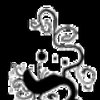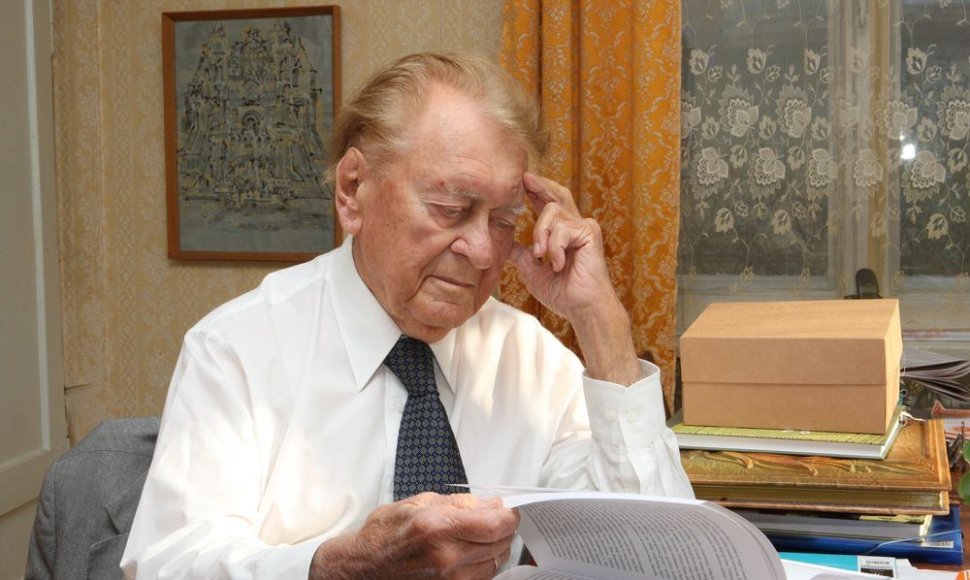When the Soviet Union occupied Lithuania on 15 June 1940, Ambrozaitis was 29. One year later, the doctor, who was working in Kaunas at the time, found himself in the middle of historic events – 14 June 1941 saw the beginning of large-scale deportations from Lithuania and several days later Nazi troops entered the country, prompting the June uprising and formation of a provisional government. At 34 Ambrozaitis, political prisoner at the time, was sent to the Vorkuta Gulag in Siberia. He was released from it two years later – with no possessions but a stained biography and a tag “kulak” which meant that no one will hire him.
The professor is now 101, even though his lucidity of mind and charm could make many a younger person envious. He meets 15min journalists at his home in Antakalnis, sporting a tie, and makes them sit a short history exam.
“When did Soviets occupy Lithuania?” he asks narrowing his eye. “15 June 1940? Wrong. Lithuania's occupation started with the return of Vilnius in 1939. That was when first Soviet garrisons entered the territory. The date you've mentioned was just the final dot on the i in the history of occupation.”
Within four years after the “final dot”, Ambrozaitis lost all of his family. His parents were the first ones to fall victims – they were taken to the Komi Republic during the great deportations. His father died one year later, mother – two years later.
- You yourself escaped deportations. How did you manage that?
- My two brothers and I were living in Kaunas at the time, while my parents owned 100 hectares of land in Raseiniai district. They simply refused to give our address to interrogators. We had heard that things would be happening, but had no idea of the scale... I remember how on the eve of deportations my friend and I were walking down the street in Kaunas and thinking: Should we start hiding or not yet? Well, we thought, we'll risk it, we're staying. And on that very night they started deporting people.
Whom did they take first? Kulaks (the name given by Soviets to “enemies of the revolution”, relatively affluent farmers). Why them? So that impoverished neighbours could divide up their property. They would get some land and the authorities would even help them settle to appease and make them even more compliant. They were fooled. The authorities would bring two or three logs – here you go, for your future house. And people would think: look at that, how great the Soviet regime is, they help people.
There was a certain quota – to take at least two families from each village. Entire families, so that the remaining members did not start avenging. The plan was to deport 7 percent of Lithuanians during 1941. If disorder persisted – 7 more percent. “Lithuania without Lithuanians” – such was the slogan of the occupying forces.
- But it wasn't the Soviet officers who put together concrete lists?
- It is very unpleasant to admit, but the lists were made by our own local authorities. My father was 75 years old and of feeble health already. Why would you take away people like that? A neighbour, who owned 40 hectares of land, also made it to the list. And so did her son – a young pleasant man – and her mother, an old lady who could hardly walk. They took her from her bed, since she was also on the list. What can you do? Local authorities were given orders – these are the numbers of people to be taken away. And so neighbours were denouncing neighbours – primarily those they weren't on good terms with, whom they envied.
- The flow of deportees was interrupted somewhat by the outbreak of war. Is it true that Lithuanians were waiting for it as their salvation?
- True. And we knew in Kaunas that there would be a war – we'd received news from our friends who lived in Germany. We thought, however, that it would start sooner. Hitler was in the habit of attacking on Sundays, when everyone's disoriented and not at their sharpest. 22 June was a day like that.
- What were you doing on that day?
- I was a young doctor at Internal Diseases Unit of Kaunas Clinics. Since I was a graduate of Kaunas Military School as well as Vytautas Magnus University, I, a reserve officer, was appointed to run the hospital as soon as bombings started – our director resigned.
And that was when the wounded started pouring in. They would take everyone to the hospital, some still clutching their guns. Russians would come first, then Germans. We had to put them in separate wards, so they didn't meet and fight – that would have been embarrassing (laughs). Soon, though, those who could still walk fled the hospital.
- On 23 June, a provisional government was formed. Did you know its members?
- Very well. I was this close to getting into the government myself. I was close friends with Ksaveras Vensius who was appointed the Minister of Health. He offered me to be his deputy. I told him I was too young and so had to decline the honour. Pity this government only lasted six weeks.
No, we didn't feel that it had no chances of surviving. The government was holding very strong, kept campaigning for acknowledgement from Germany. Well, it still existed, for however short a period, and that is good. By the way, I've recently counted – and was surprised – that I've outlived seven regimes.
- Which one was the best?
- (Laughs) Let me put it this way. When the provisional government was formed, you won't believe the patriotism that was in the air, the honesty, the national coordination – I haven't seen anything like that since.
Sure, I've heard allegations against this government for its position regarding Jews. I can assure you that Prime Minister Juozas Ambrazevičius was a very decent man and would have never had any part in it. But you know – there are people of all sorts everywhere.
And so there were in this government too. Someone once blurted that Nazis were killing Jews – and let them do it. They (in the provisional government) did not contribute to those atrocities, but blurted out a nonsense. But nor did they defend Jews, did not protest against pogroms.
- You spent almost all war in Kaunas Clinics. How did you end up in the Vorkuta Gulag?
- When the front was approaching Lithuania in 1944, I left Kaunas to go home and warn my brothers that Bolsheviks were coming back and we all had to flee. My brothers flatly refused and said they would not leave Lithuania. They went out into the forest and I haven't seen them since. I couldn't return to Kaunas on my own – all roads were blown up. There were no carriages nor drivers.
I managed to reach Šiluva where I'd been working as a doctor in 1939. The parish priest welcomed me – they needed a doctor desperately. I was once visited by a signalwoman of guerilla fighters. She told me – there was a bunker in the forest behind the river and I had to take a look at a patient there. I wouldn't agree to it at first but finally gave in to her pleas.
I biked to the bunker – and there I saw two captains, Juozas Čeponis and Jonas Žemaitis (leaders of the Lithuanian resistance after the war). And I knew both of them from my time at Raseiniai Gymnasium. They were shocked to see me themselves. They were waiting for a different doctor as, they said, rumours had it that the regime was beginning to suspect me.
But there was no turning back. It later appeared that there were two traitors in that bunker – a man and a woman. They were the ones who ratted me out. Silly affair. I was arrested and accused of taking part in the guerilla movement. Off I went to the Vorkuta Gulag.
- But you broke out of it two years later.
- I kept getting into trouble, but somehow always managed to pull myself out of it. I persistently pleaded not guilty, I demanded to see the traitors. But they were dead by then. It was a trump up my sleeve. Another lucky fact was that I was being interrogated and tried in Vorkuta, not Lithuania.
All interrogators were Komis. What am I to them? Some doctor who did god-knows-what. You could say they were the ones who saved me. I remember it as if it was yesterday: I was working in the gulag clinic, lovely morning 10 AM. Someone came and told me: “You are free.” I was instantly offered to stay and work in the clinic, as doctors were in short supply. They tried to lure me with a high position, good wages, long holidays. But I did not have a thought in my head that I could stay.
They gave me 10 days to return to Lithuania. I had to leave at once – they wouldn't even allow me to say my farewells to people. They gave me a bag of canned food and a letter saying that I didn't have to pay train fares. And trains were packed! That was where I learned to sleep erect. I hadn't had a better sleep in my entire life. There was some hot water to make tea in every station. Tea and the canned food were my biggest joy.
I was released from the gulag on 22 February and I arrived in Vilnius on 1 March. I was standing in the station and thinking – what to do now? No home, no parents, no brothers – no relatives in general. I had only friends. And they took me in.
Of course, with a biography like mine I couldn't hope for a position as a doctor. But it was chance that determined my later fate. I took a radiology course by chance. By chance, the course leader had to a leave and I was offered to step in for him. I wrote a dissertation while being an ordinary doctor. And later they set up an Oncology Institute and found themselves looking for someone to run the Radiology Department – I was offered the position. I earned it all myself.
By the way, there's an interesting anecdote. Two weeks before I was released from the gulag, I met a mid-aged Lithuanian woman. She offered to read my palm. “Come on,” said I, “I don't like such things. Well, but let's look at the palm, just for fun.” And this was what she said: “You will be released soon. You will be rich. You will live a long life.” They did release me. I get by all right – I'm an average European. I've lived past 100 years. Life is full of curiosities like that...













